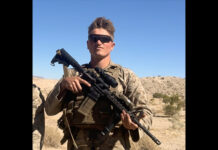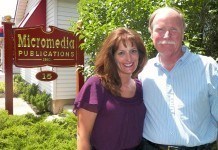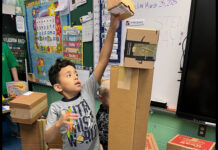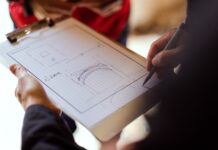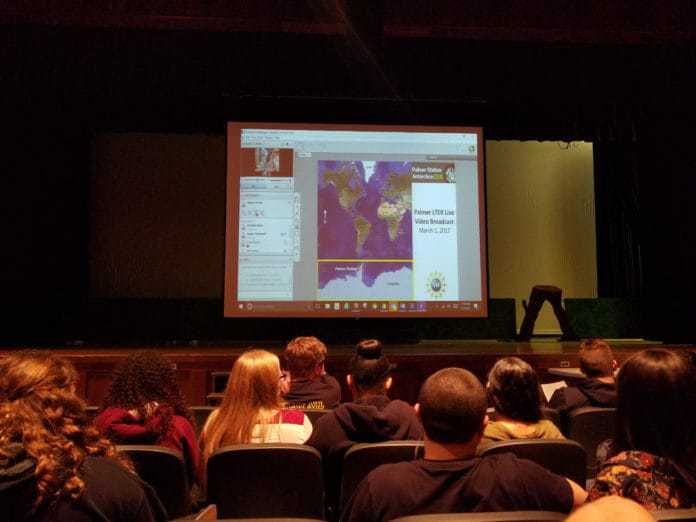
MANCHESTER – Students in the marine science program at Manchester Township High School communicated via computers with researchers in Antarctica during a special program teaching them how scientists in the field do the kind of work that they are learning about in school.
The researchers were speaking to the students live from the Palmer Station in Antarctica, school officials said. The students gathered in the school auditorium with the live feed on a large screen and were able to ask scientists questions about the research they are conducting as part of the Palmer Long-Term Ecological Research (LTER) project and about their experiences working in Antarctica. This particular chat focused on microbe ecology.
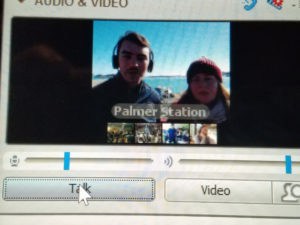
Leigh West and Adrian Jaycox, Palmer researchers from Columbia University, spoke to the students while standing outdoors at the station with the sea behind them. They appeared on the video feed in a small box in the corner of the screen, while a larger area of the screen showed slides with photos and graphics to explain what they were discussing. West said that they had just returned from collecting bi-weekly samplings from the water around the station. “Our focus is on the bacteria in water around Palmer Station and its role in carbon cycling and the bio-geo-chemical processes that are happening here,” she explained. She said the LTER project looks at how the marine food web there is responding to climate change. She and Jaycox focused on microscopic bacteria while other researchers focused on other organisms all the way up to the largest marine life, like whales.
Manchester was one of four schools on the video conference call. The other schools were Maria Carrillo High School, CA; Morehead City Middle School, NC; and Sandwich High School, MA. All of the schools prepared questions ahead of time and took turns asking them when called upon by the scientists. Below are the questions from Manchester students:
Deanna Martin asked, “Why do samples from different sea levels matter? Is there a difference in samples at different sea levels?”
West replied that there is definitely a difference based on the depth from which the samples were obtained. For example, she said samples from higher up contain more organisms because they get more sunlight and because the water has lower salinity near the top due to freshwater runoff from melting glaciers.
Charlie Kremer asked a question from Alyssa Sloan, who was absent. “What is your favorite part of this experience? How many times have you gone back? If you haven’t returned, would you go back if you had the chance?”
Jaycox said he loves being at Palmer, especially the fieldwork. “I didn’t realize how much I loved being out on the water and driving boats until I got here,” he said. He added that seeing the glaciers and the snow-capped mountains every day is another highlight, as well as the mix of people who work at the station. “It’s just amazing being here, you can never forget that you are in Antarctica.”
Aryeyana Glenn and Allie Mahler asked, “What happens if you don’t get the answers to your research that you expect? Do you feel like your research is making a difference?”
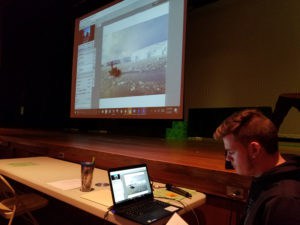
“Sometimes in science you don’t get what you are looking for but a lot of times if you find something unexpected, that can just lead you down a whole different path of discovery,” Jaycox said. “Some of the biggest discoveries in science have been when someone’s not looking for something and they kind of stumble upon it.”
He said that he felt that their research was making a difference. He pointed to a recent announcement by the signatory countries to the Antarctic Treaty declaring a large part of the Ross Sea a marine protected region in order to safeguard the ecosystem there. “It’s really fulfilling to see those kinds of tangible differences happening even as we’re down here.”
The teleconference was arranged by vice principal Stacie Ferrara, who said she saw it listed on the Rutgers University website and jumped at the chance for Manchester to participate. Although there were some technical difficulties with the audio, the students were excited to be a part of this rare opportunity.
A recording of the video chat is available at polar-ice.org/educator-resources/palmer-lter-education-outreach/pal-lter-vtcs-winter-2017/. Scroll down to the March 1, 2017 Microbe Ecology recording.



